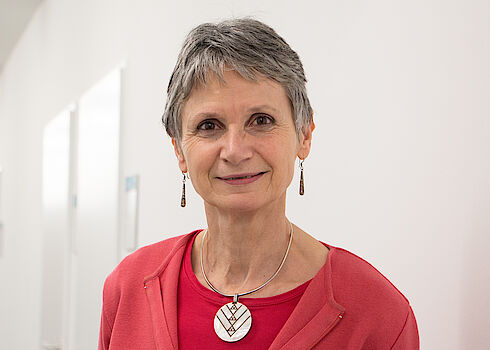Prof. Dr. Agathe Merceron is a new member of the board of the Einstein Center Digital Future (ECDF). Since August 2021, the professor of computer science at the Berlin University of Applied Sciences (BHT) has represented the partner universities. Merceron succeeds Prof. Dr. Juliane Siegeris from the Berlin University of Applied Sciences in rotation.
Merceron has been conducting research in computer science for more than 20 years with a focus on technology enhanced learning, educational data mining and learning analytics. Her research focuses on figuring out how we can better understand and improve learning and teaching with the analysis of digital data from education.
What makes ECDF special to you and where would you like to get involved during your time on the board?
Digitalization and digitalization research have been important to me for many years, and I find the ECDF's interdisciplinary approach especially exciting. Since I'm only joining now, I don't know the ECDF inside and out, but have an external view and can contribute my accumulated experience when it comes to how things can continue for the ECDF and digitization research in the coming years and decades. I am particularly looking forward to that.
Interdisciplinary collaboration is at the core of the ECDF - where do you see the added value here in the field of digitalization and what experience have you yourself gained in interdisciplinary work?
For me, the greatest advantage in interdisciplinary working is the creativity that unfolds. This creativity is urgently needed, because no area can do without digitalization anymore. We need new solutions, new approaches to how we live together. I came to interdisciplinary research more by chance than anything else: When I was working at the University of Sidney, I first came into contact with the combination of computer science and didactics: colleagues had developed a completely new method for teaching programming and published about it. A little later, I got into the field of data mining - also rather by accident. The combination of all three fields suited me and shaped my research afterwards. Of course, interdisciplinary work also brings challenges and often you have to agree on the same vocabulary first. Scientists from different disciplines often use the same words but mean different things, so you have to work your way in.
In 2015, you received the "Teacher of the Year" award. What do you find particularly important in teaching and how has Corona changed the way we teach?
For me, one thing is particularly important: What I tell should also come across. If I stand in front and the students don't follow along, then that's not the purpose. As a professor, you teach and learn with students. They often ask things you're not prepared for, which is the best part of teaching. I actually like the concept of the flipped classroom best: Instead of receiving frontal instruction from me, the students acquire the learning content at home. In the seminar, it's more about application, transfer and collaborative learning. I use breakout rooms for this purpose when teaching is done online. Of course, this type of teaching is a bit more time-consuming - materials have to be prepared and compiled in advance so that the students are able to acquire knowledge on their own - plus, of course, the pace and content have to be adjusted in the seminar, depending on what was understood at home and what was not. In my eyes, however, it has the decisive advantage that much more knowledge actually sticks. Corona means that a large part of the teaching is purely digital, and I'll be honest, the human exchange comes up short: simply talking to the person sitting next to you during the break is no longer possible, you no longer know each other - that's also important. I therefore hope that we as a society will agree on a mixture of digital and analog.

